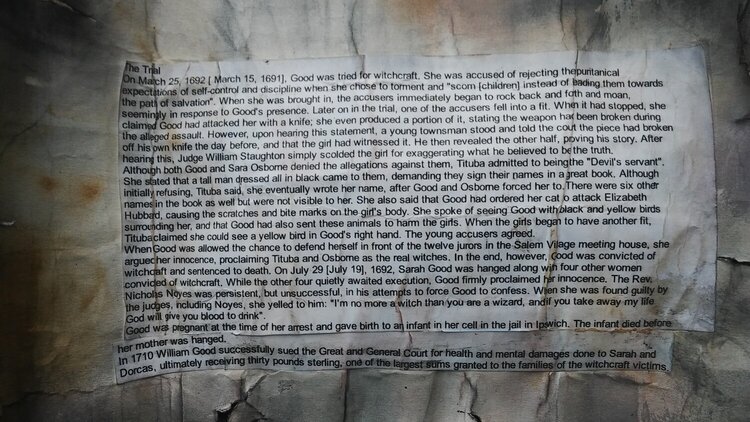Extra 10% OFF Select Scrapbooking Brands with Code: NSD24


 Give a Cheer
Give a Cheer
On March 25, 1692 Good was tried for witchcraft. She was accused of rejecting the puritanical expectations of self-control and discipline when she chose to torment and "scorn [children] instead of leading them towards the path of salvation". When she was brought in, the accusers immediately began to rock back and forth and moan, seemingly in response to Good's presence. Later on in the trial, one of the accusers fell into a fit. When it had stopped, she claimed Good had attacked her with a knife; she even produced a portion of it, stating the weapon had been broken during the alleged assault. However, upon hearing this statement, a young townsman stood and told the court the piece had broken off his own knife the day before, and that the girl had witnessed it. He then revealed the other half, proving his story. After hearing this, Judge William Staughton simply scolded the girl for exaggerating what he believed to be the truth.
Although both Good and Sarah Osborne denied the allegations against them, Tituba admitted to being the "Devil's servant". She stated that a tall man dressed all in black came to them, demanding they sign their names in a great book. Although initially refusing, Tituba said, she eventually wrote her name, after Good and Osborne forced her to. There were six other names in the book as well but were not visible to her. She also said that Good had ordered her cat to attack Elizabeth Hubbard, causing the scratches and bite marks on the girl's body. She spoke of seeing Good with black and yellow birds surrounding her, and that Good had also sent these animals to harm the girls. When the girls began to have another fit, Tituba claimed she could see a yellow bird in Good's right hand. The young accusers agreed.
When Good was allowed the chance to defend herself in front of the twelve jurors in the Salem Village meeting house, she argued her innocence, proclaiming Tituba and Osborne as the real witches. In the end, however, Good was convicted of witchcraft and sentenced to death. On July 29,1692. Sarah Good was hanged along with four other women convicted of witchcraft. While the other four quietly awaited execution, Good firmly proclaimed her innocence. The Rev. Nicholas Noyes was persistent, but unsuccessful, in his attempts to force Good to confess. When she was found guilty by the judges, including Noyes, she yelled to him: "I'm no more a witch than you are a wizard, and if you take away my life God will give you blood to drink".
Good was pregnant at the time of her arrest and gave birth to an infant in her cell in the jail in Ipswich. The infant died before her mother was hanged.
In 1710 William Good successfully sued the Great and General Court for health and mental damages done to Sarah and Dorcas, ultimately receiving thirty pounds sterling, one of the largest sums granted to the families of the witchcraft victims.
No products have been added to this project.
Thanks for spreading positivity!
July 25, 2018
July 25, 2018
May 14, 2018
September 27, 2017
September 27, 2017
September 27, 2017
September 27, 2017
September 26, 2017
September 26, 2017